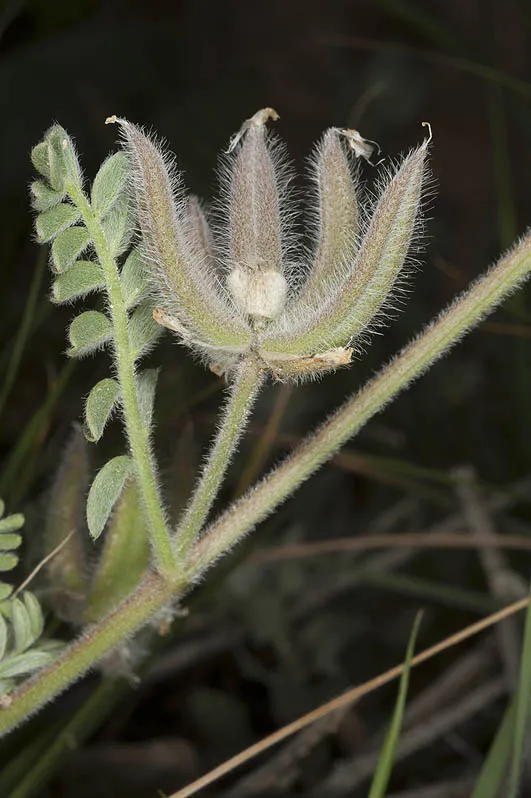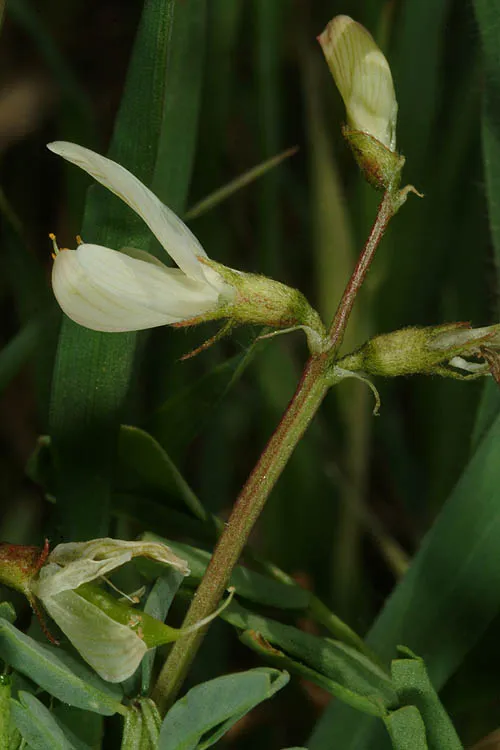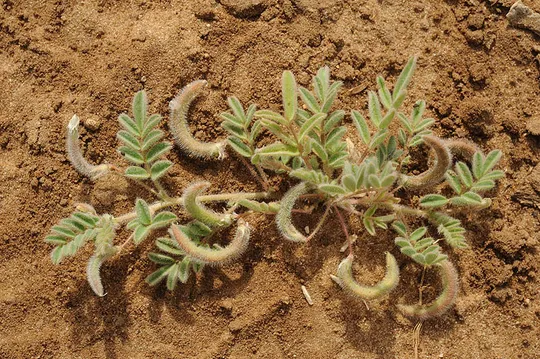Capitate Milk-vetch
Astragalus oocephalus
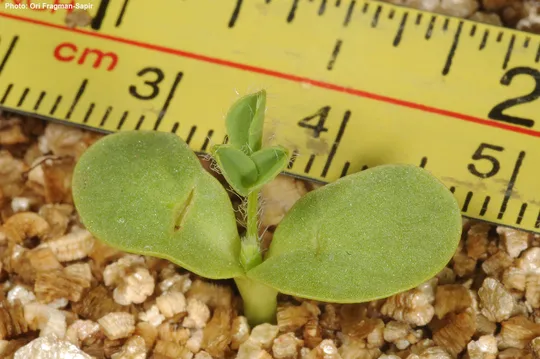
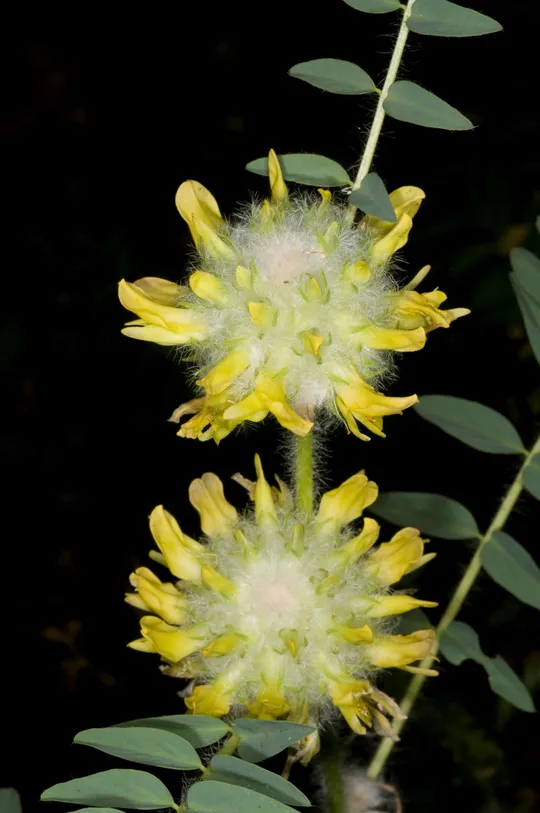
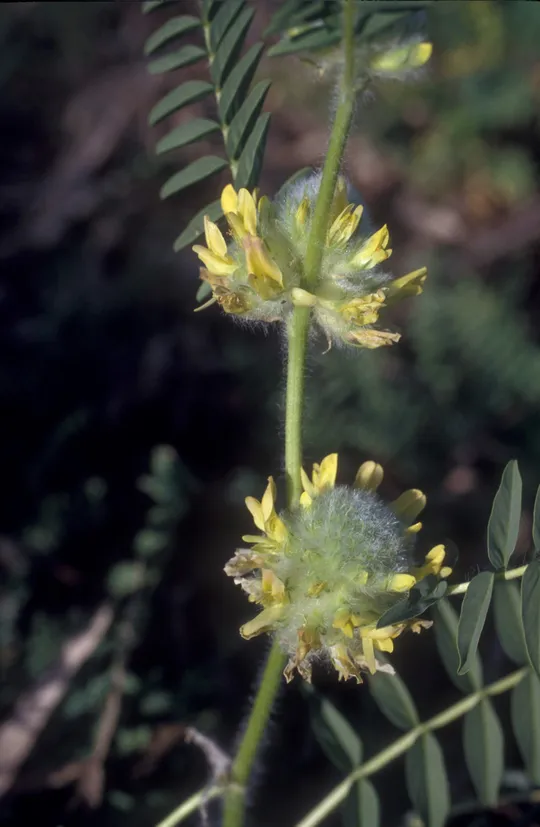
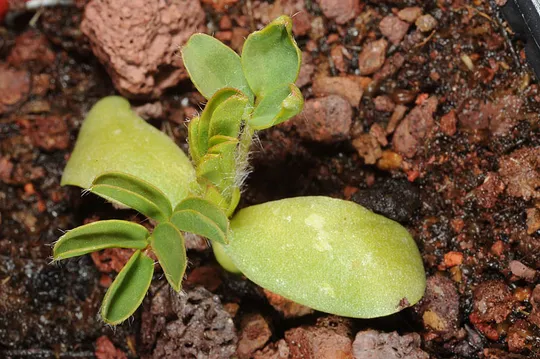
Astragalus oocephalus now grows only in the Jezreel Valley, on a single site
in a eucalyptus grove near Afula Ilit ("grove of the rare species"). Tuvia
Kushnir collected the species (probably from there) in 1942 in the Giv’at
HaMore-Mount Tabor area, but since then it has not been seen for many years and
was considered extinct in Israel. In 1993 several dozen specimens were found in
the grove in Afula Ilit, by Fragman and Sharabani. In the past, in 1924, the
plant was also collected in the Hula Valley from Mishmar
HaYarden and Bnot Ya'akov
Bridge (Naftolsky) and again by Yair Or in 1990, but since then it has not been
found and is extinct from this region too.
Herbaceous vegetation in deep alluvial soils
in valleys. Currently known only from the planted eucalyptus grove.
For the characteristics of the genus Astragalus
– see A. trimestris. The species distribution in the world and in
Israel: in Israel, excluding the Hermon, 36 Astragalus species grow. Thirteen additional
species grow on the Israeli section of Mount Hermon and another eight species
grow in Jordan. In Iraq, 122 Astragalus species grow and in Turkey –
372. These numbers are indicative of the vast abundance of Astragalus
species in the Irano-Turanian region. In Iran and in Afghanistan, the countries
in which the genus center is located, there are some 1000 Astragalus
species that belong to 51 different sections! This is the greatest morphological-evolutionary
richness within one genus known in the world. Some sections are entirely
composed of annual species; they are mainly concentrated in desert ecosystems. The
main growth form in other sections is thorny dwarf shrubs. Among these is the tragacanth group that creates spiny cushions and dominates the
alpine areas of arid Asia. This group, which numbers about 250 different
species, were once considered a separate genus – Astacantha (= Tragacantha)
and it is probably the origin of the genus Caragana that includes low spiny
trees that grow from Turkey to the Himalayas.
Alexander Eig conducted the first
comprehensive taxonomic study on the genus in the 1930s. The monograph was
published only in 1955 in Jerusalem many years after his death.
A. oocephalus belongs to the Alopecias
section that has characteristic large leaves that lack a terminal spine and whose
flowers are arranged in a dense spherical or elongated inflorescence. In
eastern Jordan A. azraqansis grows – a closely related species, endemic to this region,
whose distribution reaches Ǧebel Druz. In Turkey and in the Caucasus there are several other species from
this section.
·
Astragalus
oocephalus once grew in two regions in which it is
considered extinct, but was found again in one of them. The Afula Ilit population
survives at the site since its discovery until the present.
·
The
only existing population occupies a patch of circa ½ ha, which contains a few
dozen plants.
·
The
Afula Ilit site is subject to anthropogenic activity that could destroy the
population. The small number of plants exposes the population to reproductive threats
and to the probability of random extinction.
·
A.
oocephalus is not protected in a nature reserve.
·
There
is a lack of detailed information on the global status of the species; it does
not appear in red books.
The eucalyptus grove west of Afula Ilit should
be declared a nature reserve of clay valley soil together with KKL-JNF, to
preserve this unique species as well as other species growing there, some of
them endangered species – Lathyrus cassius, Lachnophyllum noaeanum, Onosma
gigantea, Phlomis pungens, Vinca herbacea, Bellevalia warburgii, etc.
Seeds should be collected for backup. Efforts should be made to germinate them,
to study germination rates and if successful, to monitor established seedlings.
Cultivating A. oocephalus in
refuge gardens close to their natural site, on deep clay soil, should be
considered. Because of limited fruit formation, vegetative propagation methods
should be studied as well.
Turkey, northwestern Iraq, Syria, Lebanon and
northern Israel.
Astragalus oocephalus is a perennial herbaceous plant of deep clay soils. It
is an extremely rare plant with a small population at a single site in the
Jezreel Valley that is threatened by human activity. It was considered as
extinct in Israel, but it was rediscovered in 1993 and since then the
population continues to survive at the site.
Current Occupancy Map
| 1000 squre meter pixel | 5000 squre meter pixel | 10000 squre meter pixel | |
|---|---|---|---|
| number of observations | 0 | 0 | 0 |
| in total pixels | 0 | 0 | 0 |
| Family | Fabaceae |
| Classification | On the endangered species list |
| Ecosystem | Mediterranean |
| Chorotype | Western Irano - Turanian |
| Conservation Site | Afula Ilit grove, Resettled in Ashaf Ruins east of Ayelet HaShahar and l Wadi Rosh Pina near Mishmar HaYarden |
| Rarity |
1
6
6
|
|---|---|
| Vulnerability |
0
3
4
|
| Attractiveness |
0
2
4
|
| Endemism |
0
0
4
|
| Red number |
1
-1.0
10
|
| Peripherality | N |
| IUCN category | DD EW EX LC CR EN VU NT |
| Threat Definition according to the red book | Extinct |
 Based on:
Based on:
